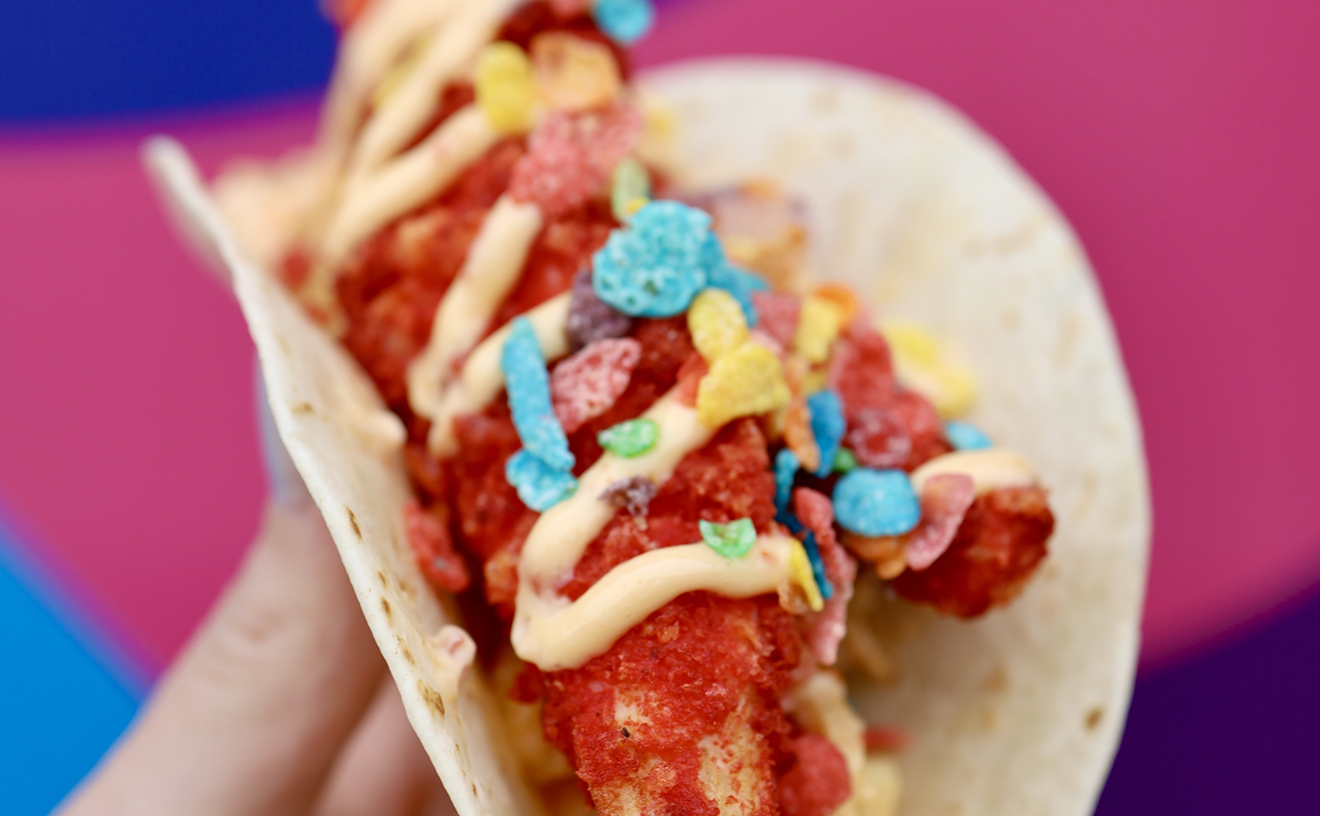Lately, though, it looks as if local restaurateurs have finally divined what Dade's dining public really wants: fancy fare in less formal dining rooms. Quantity as well as quality. Sophistication without pricey pretension. Hence the remodeling of North Miami Beach's stuffy Chez Philippe into comfy Philippe's Cafe. The bargain of the prix-fixe menu at Brasserie L'Entrecote in Coconut Grove. The success of South Beach's Nemo, where portions are plentiful and the model-watching is fine.
So I was shocked to find that the revamped Casa Rolandi, whose ownership has been taken over by the Tula Group (owners of the Italian restaurant Tula in Coconut Grove), was charging $22.50 for risotto al radicchio. For those readers whose Italian is a little rusty, I'll translate the name of that dish, which was a special on the night of my visit: rice with lettuce. Then again, only two out of Rolandi's six appetizers sell for under ten dollars. And a mere two out of fourteen main courses go for less than twenty. Knowing the tally from the outset, I suppose I'd still have paid it gladly if the food and service had been outstanding.
Needless to say, they weren't.
Though the restaurant wasn't busy, twenty minutes elapsed before our waiter even bothered to greet us; he proceeded to disappear for long intervals throughout the meal. His lack of interest in his job abated only when we seemed likely to order the most expensive items on the menu.
"How's the quail?" I asked. (Almost 25 smackers.)
"Oh, excellent," he beamed.
Another twenty minutes later, he was back. The restaurant had no quail. I requested the menu.
"Try the duck," he said, instead of complying. (Same price tag, natch.) I requested the menu again. He brought it, reluctantly. Though I wound up ordering pasta (half the price), I got charged for the quail.
The waiter's laxness was matched by the restaurant's general lack of direction. I can't imagine, for instance, why an Italian eatery would serve pita bread -- unless it ran out of a more appropriate starch and borrowed some from Vakhos, its Greek neighbor across the street. Yet there it was, hot from the oven, puffed up like a blowfish, brushed with olive oil, and flanked by packaged Italian bread sticks.
We used the pita to scoop up a garlicky, brothy tomato sauce in which a dozen or so clams had been poached. Small but plump, the shellfish were tasty, as was the tangy marinara. Two of the clams were closed tight, however, signifying that they were dead before they'd been cooked and shouldn't be eaten. This happens at seafood shacks. But Casa Rolandi is no seafood shack.
An appetizer of smoked chicken sausage presented Asian flavors, an odd pairing with the very Mediterranean clam zuppa. One commercial-tasting sausage, red as an Oscar Mayer wiener, had been grilled and split in half lengthwise, then dressed with slices of tough, skin-on apples instead of the apple sauce promised on the menu. A garnish of rubbery shiitake mushrooms was similarly detrimental. Another starter, sliced sirloin steak resting on a bed of chopped arugula, was unwarrantedly generous, given the poor quality of the meat. Gristly beef, sharp with too much balsamic vinegar, was topped with spiny, improperly steamed sun-dried tomatoes.
A long pause between courses left us plenty of time to dread the upcoming entrees. It's a good thing we prepared ourselves. Baked leg of lamb, the worst of the lot, brought back memories of the countless overdone pot roasts I've had to gnaw on at Passover seders. The slice of meat was arid and chewy, stuffed with minced spinach, and smothered in an onion-heavy vegetable-and-wine sauce. Shaped into a sphere the size of a matzo ball, a polenta side dish had good flavor but was dense enough to displace its weight in water.
Tortelloni Casa Rolandi brought us from Mesopotamia back to the Mediterranean -- sort of. Five large dumplings, folded over like won tons, were filled with fontina cheese. Though a glossy truffle demiglace accented the mild stuffing and al dente wrapping perfectly, the cheese had a tendency to congeal as the tortelloni cooled, which it did rapidly. A bowl of penne didn't have this difficulty -- the amount of oil that lubricated these noodles would have kept the Tin Man break dancing all the way to the Emerald City. Tossed with garlic, canned tuna, and fresh green broccoli, the pasta was passable if a bit slippery. Any thought of packaging hard-to-spear leftovers to take home, however, was extinguished when the waiter threw crumpled bread-stick wrappers into the bowl before he removed it from the table.
Cellophane notwithstanding, we wouldn't have wanted to take dolphin in a creamy curry sauce anywhere. The trip from plate to mouth was difficult enough. The fish, a special that evening, was lacking in both flavor and expertise of preparation. It wasn't about to be redeemed by a medicinal yellow curry dressing whose bitterness was hardly tempered by an abundant supply of cream. A side dish of overcooked summer squash and carrots didn't represent any improvement.
The restaurant had little to offer by way of dessert. A black-and-white chocolate mousse cake sounded appealing. Wrong again. A slice of all-black (no white) chocolate cake was old and crumbly, not moist and rich. An appropriately past-its-prime end to the meal.
Recessed murals, wood-trimmed walls, a ceiling beamed with tree trunks, and patterned banquettes make Casa Rolandi a handsome place to dine. Prospective customers might be drawn in by such promising surroundings, as well as by the change of management, heralded in advertisements. But exorbitant prices, indifferent service, and sloppy execution will certainly temper any enthusiasm the public has rediscovered for this Coral Gables establishment.
Side Dish
Where there's smoke, there ain't always fire.
Last summer, South Beach's Bang was wet wood, trying to overcome a debilitating nightclub image and regain its popularity as a romantic dining spot. Enter award-winning chef Robbin Haas -- whose high-profile, New World skills have been the kindling that renewed Bang's explosive potential.
A year later, Haas, who was made part owner when he joined the establishment, is giving up his Bang shares to combine forces with fellow chef-restaurateur Mark Miller, a long-time friend. Miller, who gained national attention for his Coyote Cafe restaurants and his cookbooks that feature Southwestern cuisine, operates the renowned Red Sage restaurant in Washington, D.C., in addition to numerous other enterprises. After touring Asia for six weeks, researching cooking techniques and flavors, Miller and Haas will return to practice new recipes at Red Sage in preparation for the opening of Miller's company's latest concept: Raku, an Asian diner (three of which will debut in D.C. by the spring of next year. Then they'll be off to San Francisco's Ghirardelli Square, where in the summer of 1997 they will open what Miller calls a "huge modern Asian bistro."
Still nameless, the bilevel restaurant, which is housed in a turn-of-the century restaurant overlooking the bay, will feature 40-foot ceilings, brick walls, and gallery-quality lacquerware. "Robbin knows what he's getting into, and I know what I'm getting," an optimistic Miller says by phone from his corporate headquarters in the nation's capital.
Although Haas says he's looking forward to his new challenges, his departure is tinged with some regret. "Miami has been more than beneficial for me," he notes. "It's been benevolent."
No doubt some of that bittersweetness will be wiped out by the spicy fare chef Scott Howard of Lure is cooking for Haas's farewell dinner at the end of this month. Culinary luminaries on the guest list include Oliver Saucy, Mark Militello, Allen Susser, and Norman Van Aken.
As for Bang, Haas says he and his staff, which will stay on at least until a new chef is named, are devising a simpler menu that will be executable without his guidance. With accomplished chef and part-owner Geoffrey Murray still in the biz, Bang may well blaze again.










